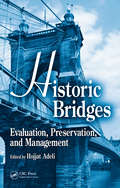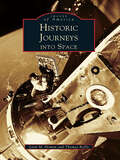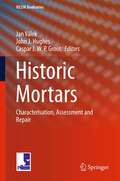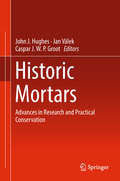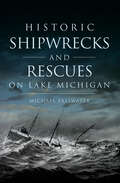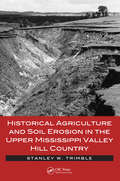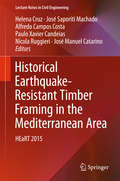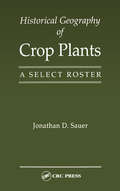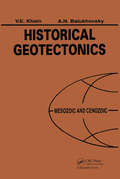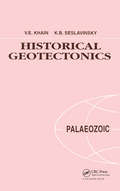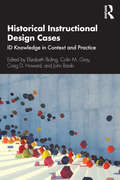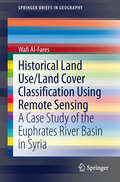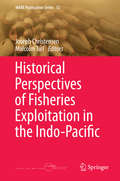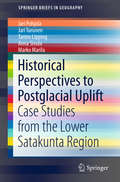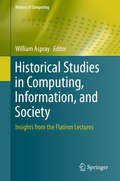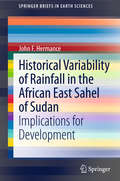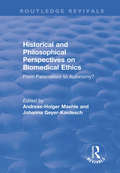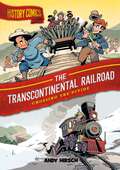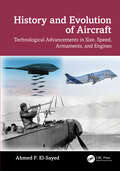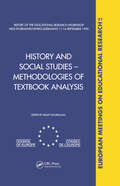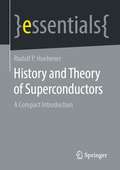- Table View
- List View
Historic Bridges: Evaluation, Preservation, and Management
by Hojjat AdeliExplore Historic Bridge Design through the Perspective of Modern EngineeringHistoric Bridges:Evaluation, Preservation, and Management provides both an admiring and a technical account of bridge engineering through an exploration of several remarkable examples. From ancient China to modern-day Minnesota, the book di
Historic Construction and Conservation: Materials, Systems and Damage
by Pere Roca Paulo B. Lourenço Angelo GaetaniConservation in the built environment raises fundamental questions which have been debated for centuries - what is worth preserving, how is it possible, why is it important? This book takes a modern approach to the meaning of a heritage structure and its conservation. The historical evolution of conservation is briefly addressed, considering prominent individuals and cases; along with the history of construction, focusing on materials and related structural elements, with insight on the sizing rules adopted by masons. This explains structural decisions made during the construction process and allows comparison of scientific theories from the 18th century to modern understanding of limit analysis. Damage and collapse mechanisms for masonry construction, as the most widespread structural form for historical buildings, is described. Excess permanent loading and settlement is differentiated from environmental and anthropogenic actions such as earthquake or incorrect intervention. The team of authors brings together unique expertise, with high level research and leading practice with archetypical cases from around the world. The book addresses the history of conservation by exploring materials and structures and the history of construction and damage, so it is of value to students and professionals in civil engineering and architecture, as well as archaeologists and art historians.
Historic Fires of Fall River (Disaster)
by Stefani KooreyFall River's textile boom in the nineteenth century brought with it a series of fiery disasters. The Big Fire of 1843 left more than one thousand people homeless and destroyed two hundred buildings, as well as twenty-some acres of land. After the Steiger Store Fire of 1916, mill owners pushed the city to replace horse-drawn brigades with fire engines. The intense heat from the Kerr Mill Thread Fire of 1987 melted hoses as first responders battled the blaze. Author Stefani Koorey chronicles the historic infernos of the Spindle City and celebrates the community's resilience in the face of adversity.
Historic Indoor Microclimate of the Heritage Buildings
by Kristian Fabbri Marco PretelliOffering readers essential insights into the relationship between ancient buildings, their original and current indoor microclimates, this book details how the (generally) virtuous relationship between buildings and their typical microclimate changed due to the introduction of new heating, ventilation, and air conditioning (HVAC) systems in historic buildings.The new approach to the study of their Historic Indoor Microclimate (HIM) put forward in this book is an essential component to monitoring and evaluating building and artefact conservation. Highlighting the advantages of adopting an indoor microclimatic approach to the preservation of existing historic materials by studying the original conditions of the buildings, the book proposes a new methodology linking the preservation/restoration of the historic indoor microclimate with diachronic analysis for the optimal preservation of historic buildings. Further, it discusses a number of frequently overlooked topics, such as the simple and well-coordinated opening and closing of windows (an example extracted from a real case study). In turn, the authors elaborate the concept of an Historic Indoor Microclimate (HIM) based on “Original Indoor Microclimate” (OIM), which proves useful in identifying the optimal conditions for preserving the materials that make up historic buildings. The book’s main goal is to draw attention to the advantages of an indoor microclimatic approach to the preservation of existing historic materials/manufacture, by studying the original conditions of the buildings. The introduction of new systems in historic buildings not only has a direct traumatic effect on the actual building and its components, but also radically changes one of its vital immaterial elements: the Indoor Microclimate.Architects, restorers and engineers will find that the book addresses the monitoring of the indoor microclimate in selected historic buildings that have managed to retain their original state due to the absence of new HVAC systems, and reflects on the advantages of a renewed attention to these aspects.
Historic Journeys Into Space (Images of America)
by Lynn M. Homan Thomas ReillyFrom the January 1958 launch of the first American satellite to the creation of the National Aeronautics and Space Administration by President Eisenhower just a few months later, from the heated space race of the Cold War era to the heroes of shuttle launches, the United States has been on the leading edge of space exploration and technology. Initially developed from one of Adolph Hitler's most feared weapons, the V2 rocket, the space program has accomplished much in just a few short decades. The first American manned space flight, which put astronaut Alan Shepard into space, was launched in 1961; in 1965, Edward White became the first American to walk in space--for a total of 21 minutes. In 1969, Neil Armstrong uttered those now-famous words as he became the first human to walk on the Moon. These and many other achievements, once considered unimaginable, have inspired and amazed the American people and engaged our brightest scientific minds.
Historic Mortars
by Caspar J. Groot Jan Válek John J. HughesThis volume focuses on research and practical issues connected with mortars on historic structures. The book is divided into four sections: Characterisation of Historic Mortars, Repair Mortars and Design Issues, Experimental Research into Properties of Repair Mortars, and Assessment and Testing. The papers present the latest work of researchers in their field. The individual contributions were selected from the contributions to the 2nd Historic Mortars Conference, which took place in Prague, September, 22-24, 2010. All papers were reviewed and improved as necessary before publication. This peer review process by the editors resulted in the 34 individual contributions included in here. One extra paper reviewing and summarising State-of-the-Art knowledge covered by this publication was added as a starting and navigational point for the reader. The editors believe that having these papers in print is important and they hope that it will stimulate further research into historic mortars and related subjects.
Historic Mortars: Advances in Research and Practical Conservation (Rilem Bookseries Ser. #7)
by Caspar J. Groot Jan Válek John J. HughesThis book presents a state of the art in mortar characterisation, experimentation with and applications of new mortars for conservation and repair of historic buildings. This volume includes the following topics: characterisation of historic mortars (methods, interpretation, application of results), development of new materials for conservation (compatibility, durability, mix designs), the history of mortar technology and fundamental experimental studies of material properties. The papers have been selected from those presented at the 3rd Historic Mortars Conference, held in Glasgow, Scotland, September 11-14th 2013. All the papers here underwent a two stage peer review process, for the conference and again for this volume. In some cases this has resulted in a revision and updating of content.
Historic Shipwrecks and Rescues on Lake Michigan (Disaster)
by Michael PasswaterFacing the fury and danger of Lake MichiganEver since French explorers first cast their eyes on Lake Michigan, this huge inland sea has been the scene of thousands of shipwreck rescues and tragedies. As mishaps and disasters proliferated, a dedicated service of lifesavers arose. Braving perilous conditions, these servicemen pulled those aboard the merchant schooner Havanna from certain death. The intrepid St Joseph Lifesavers saved the crew and passengers of the City of Duluth. Sadly, not all rescues ended in heroism, as was the case with the doomed Arab that went down along with two other ships. Author Michael Passwater captures the stories of shipwrecks and the brave men and women that risked their lives against an angry Lake Michigan.
Historical Agriculture and Soil Erosion in the Upper Mississippi Valley Hill Country
by Stanley W. Trimble"This thought-provoking book demonstrates how processes of landscape transformation, usually illustrated only in simplified or idealized form, play out over time in real, complex landscapes. Trimble illustrates how a simple landscape disturbance, generated in this case by agriculture, can spread an astonishing variety of altered hydrologic and sedi
Historical Earthquake-Resistant Timber Frames in the Mediterranean Area
by Nicola Ruggieri Gennaro Tampone Raffaele ZinnoThis book presents a selection of the best papers from the HEaRT 2013 conference, held in Cosenza, Italy, which provided a valuable forum for engineers and architects, researchers and educators to exchange views and findings concerning the technological history, construction features and seismic behavior of historical timber-framed walls in the Mediterranean countries. The topics covered are wide ranging and include historical aspects and examples of the use of timber-framed construction systems in response to earthquakes, such as the gaiola system in Portugal and the Bourbon system in southern Italy; interpretation of the response of timber-framed walls to seismic actions based on calculations and experimental tests; assessment of the effectiveness of repair and strengthening techniques, e. g. , using aramid fiber wires or sheets; and modelling analyses. In addition, on the basis of case studies, a methodology is presented that is applicable to diagnosis, strengthening and improvement of seismic performance and is compatible with modern theoretical principles and conservation criteria. It is hoped that, by contributing to the knowledge of this construction technique, the book will help to promote conservation of this important component of Europe's architectural heritage.
Historical Earthquake-Resistant Timber Framing in the Mediterranean Area
by Nicola Ruggieri Helena Cruz José Saporiti Machado Alfredo Campos Costa Paulo Xavier Candeias José Manuel CatarinoThis book presents a selection of the best papers from the HEaRT 2015 conference, held in Lisbon, Portugal, which provided a valuable forum for engineers and architects, researchers and educators to exchange views and findings concerning the technological history, construction features and seismic behavior of historical timber-framed walls in the Mediterranean countries. The topics covered are wide ranging and include historical aspects and examples of the use of timber-framed construction systems in response to earthquakes, such as the gaiola system in Portugal and the Bourbon system in southern Italy; interpretation of the response of timber-framed walls to seismic actions based on calculations and experimental tests; assessment of the effectiveness of repair and strengthening techniques, e. g. , using aramid fiber wires or sheets; and modelling analyses. In addition, on the basis of case studies, a methodology is presented that is applicable to diagnosis, strengthening and improvement of seismic performance and is compatible with modern theoretical principles and conservation criteria. It is hoped that, by contributing to the knowledge of this construction technique, the book will help to promote conservation of this important component of Europe's architectural heritage.
Historical Geography of Crop Plants: A Select Roster
by Jonathan D. SauerHistorical Geography of Crop Plants is devoted to a variety of staple and food crops, as well as fodder, fiber, timber, rubber, and other crops. The origins and histories of many of these crops have been clarified only recently by new research. The book has been arranged alphabetically by family and higher taxa for easy reference. Within families, species and cultivars are listed chronologically and geographically. The taxonomy and geography of probable wild progenitors have been outlined, and archeological evidence (when available) and historical evidence on region and domestication are traced. The subsequent evolution and spread of many domesticated species are examined, and the reasons behind the diversity in crop histories are explored. Historical Geography of Crop Plants will be a useful reference for botanists, economic botanists, ethnobiologists, agronomists, geographers, and others interested in the subject.
Historical Geotectonics - Mesozoic and Cenozoic
by V.E. Khain A.N. BalukhovskyExamines the structural evolution of the Earth's crust from the Triassic period to the present. The book describes the patterns of distribution, and the composition and accumulation conditions of formations in the various geological periods in all the continents and oceans.
Historical Geotectonics - Palaeozoic: Russian Translations Series 115
by V.E. Khain; K.B. SeslavinskyTranslated from Russian, this text looks at the development of the earth's crust in the Palaeozoic period and starts from the Vendian to the Late Cambrian period. Moving on to include Ordovician to the mature stage of Caledonian and initial stage of development of Hercynian mobile belts; Silurian-Early Devonian. The completion of development of the Caledonian and early, mature and end stages of the Hercynian mobile belts; the birth of Cimmerian mobile belts and ending with the Palaeozoic.
Historical Instructional Design Cases: ID Knowledge in Context and Practice
by Elizabeth Boling Colin M. Gray Craig D. Howard John BaakiHistorical Instructional Design Cases presents a collection of design cases which are historical precedents for the field with utility for practicing designers and implications for contemporary design and delivery. Featuring concrete and detailed views of instructional design materials, programs, and environments, this book’s unique curatorial approach situates these cases in the field’s broader timeline while facilitating readings from a variety of perspectives and stages of design work. Students, faculty, and researchers will be prepared to build their lexicon of observed designs, understand the real-world outcomes of theory application, and develop cases that are fully accessible to future generations and contexts.
Historical Land Use/Land Cover Classification Using Remote Sensing: A Case Study of the Euphrates River Basin in Syria
by Wafi Al-FaresAlthough the development of remote sensing techniques focuses greatly on construction of new sensors with higher spatial and spectral resolution, it is advisable to also use data of older sensors (especially, the LANDSAT-mission) when the historical mapping of land use/land cover and monitoring of their dynamics are needed. Using data from LANDSAT missions as well as from Terra (ASTER) Sensors, the authors shows in his book maps of historical land cover changes with a focus on agricultural irrigation projects. The kernel of this study was whether, how and to what extent applying the various remotely sensed data that were used here, would be an effective approach to classify the historical and current land use/land cover, to monitor the dynamics of land use/land cover during the last four decades, to map the development of the irrigation areas, and to classify the major strategic winter- and summer-irrigated agricultural crops in the study area of the Euphrates River Basin.
Historical Perspectives of Fisheries Exploitation in the Indo-Pacific
by Joseph Christensen Malcolm TullThe waters of the Indo-Pacific were at the centre of the global expansion of marine capture fisheries in the twentieth century, yet surprisingly little has been written about this subject from a historical perspective. This book, the first major study of the history of fishing in Asia and Oceania, presents the case-studies completed through the History of Marine Animal Populations (HMAP) initiative. It examines the marine environmental history and historical marine ecology of the Indo-Pacific during a period that witnessed the dramatic escalation of industrial fishing in these seas.
Historical Perspectives to Postglacial Uplift: Case Studies from the Lower Satakunta Region (SpringerBriefs in Geography)
by Jari Pohjola Jari Turunen Tarmo Lipping Anna Sivula Marko MarilaThis Brief discusses a unique mechanism to combine historical and archaeological evidence with statistical geodynamic modeling to study the historical development of the Eura region in lower Satakunta, Finland; this region is known for its rich cultural history. The book presents methods to model postglacial land uplift and the historical landscape. By using coupled data, it is possible to narrow the dating estimates of the archaeologically important places and structures and to build a more detailed reconstruction of landscape evolution in connection with the knowledge about human settlements and their movements. The resulting geospatial and uplift models are included as supplements.The primary audience for this book is experts and professionals working in the fields of archaeology, geography, geology and geospatial data analysis.
Historical Studies in Computing, Information, and Society: Insights from the Flatiron Lectures (History of Computing)
by William AsprayThis is a volume of chapters on the historical study of information, computing, and society written by seven of the most senior, distinguished members of the History of Computing field. These are edited, expanded versions of papers presented in a distinguished lecture series in 2018 at the University of Colorado Boulder – in the shadow of the Flatirons, the front range of the Rocky Mountains. Topics range widely across the history of computing. They include the digitalization of computer and communication technologies, gender history of computing, the history of data science, incentives for innovation in the computing field, labor history of computing, and the process of standardization. Authors were given wide latitude to write on a topic of their own choice, so long as the result is an exemplary article that represents the highest level of scholarship in the field, producing articles that scholars in the field will still look to read twenty years from now. The intention is to publish articles of general interest, well situated in the research literature, well grounded in source material, and well-polished pieces of writing. The volume is primarily of interest to historians of computing, but individual articles will be of interest to scholars in media studies, communication, computer science, cognitive science, general and technology history, and business.
Historical Variability of Rainfall in the African East Sahel of Sudan: Implications for Development
by John F. HermanceThe northward migration of the African monsoon rains in summer, associated with the seasonal march of the Intertropical Convergence Zone (ITCZ) across the plains south of the Sahara, is the most critical asset for the livelihoods of indigenous peoples and local economies of the Sahel. It is essential that climate science (and its publicly available database) play a key role in characterizing the variabilities of these rainfall patterns in space and time if sustainable life styles are to accommodate the expanding populations of the region. This study turns to the East Sahel of Sudan by analyzing over 100 years of historical rainfall data from three of the few long term standard WMO rain gauge stations in substantially different rainfall settings. From north to south, transecting the Sahel, the stations with their annual rainfall are Khartoum (130 mm); Kassala (280 mm); and Gedaref (600 mm). The conclusions challenge a popular notion that changing climate, drought and desertification in the East Sahel may have already accelerated the deterioration of its water resources. However, any evidence of a persistent and coherent regional trend of diminishing rainfall is obscure. Quite the contrary, the evidence demonstrates that the fluctuations of climate and weather patterns over the ensuing decades of the past century - at all temporal scales from days to years to decades - profoundly overwhelm any suggestion of a large-scale, coherent decrease (or increase) in rainfall. The implication is that, it is not long term change, but the highly localized interseasonal, interannual and multiannual variability of rainfall that poses the greatest and most immediate societal threat from naturally-induced causes; a process constantly destabilizing an agrarian economy struggling to survive in a climate that irregularly vacillates between years of drought and years of flooding. While this report may have some interest for climate scientists, it is primarily directed to a general readership (including students in public policy and anthropology) concerned with the availability of water in the Sahel, particularly the long term sustainability of local small-scale farms and transhumant pastoralism.
Historical and Philosophical Perspectives on Biomedical Ethics: From Paternalism to Autonomy? (Routledge Revivals)
by Andreas-Holger Maehle Johanna Geyer-KordeschThis title was first published in 2002: This volume discusses the subject of biomedical ethics. Various views, historical and contemporary, are discussed, with the editors using the contrasting concepts in the shift from paternalism to autonomy in 20th-century medicine as a heuristic tool for the critical study of ethics in medicine.As far as the evidence in this volume goes, paternalistic medical practices and patient autonomy had an uneasy relationship by the beginning of the 20th century. A hundred years later, full autonomy in decisions on medical treatment is still subject to numerous caveats. The text pays close attention to the interplay between various players, noting how factors such as social contexts, governmental organizations and the biotechnological industry influence and shape responses to the principle of bioethics.
History Comics: Crossing the Divide (History Comics)
by Andy HirschTurn back the clock with History Comics! In this graphic novel, experience the great railroad race between Central Pacific and Union Pacific. Wealth and glory await whichever builds the longest track!In 1863, America is divided not just by the civil war but by months of travel over thousands of miles. Two railroad companies, one each from East and West, are given the task of connecting the nation by rail. Building this railroad will be a monumental undertaking, difficult and dangerous. The work falls to immigrant laborers from the lowest economic classes. They accomplish astounding feats of engineering while waiting for an answer: Will those who connect the country be accepted into it?
History and Evolution of Aircraft: Technological Advancements in Size, Speed, Armaments, and Engines
by Ahmed F. El-SayedHistory and Evolution of Aircraft reviews the history of aviation from early history to the present day, including the evolution milestones of military aircraft, civil aircraft, helicopters, drones, balloons, airships, and their engines. It also provides the background and development of different types of aircraft, including manned and unmanned vehicles, aircraft carriers, fixed or rotary wings, air, sea, and amphibian flight vehicles.Covering current and developing applications of unmanned aerial vehicles (UAVs), the book highlights the prospects of future flying vehicles including automotives and jetpacks. It follows the transition from piston to jet engines that include shaft-based engines (turboprop, turboshaft, and propfan), turbine-based engines (turbojet and turbofan), and athodyd engines (ramjet, turbo-ramjet, and scramjet). The book explores flight vehicles’ technological advancements and evolution, including their geometrical features and performance parameters. It will also include nine appendices resembling databases for all types of aircraft.The book will be a useful reference for academic researchers and aviation, aerospace, and mechanical engineering students taking aerodynamics, aircraft structures, aircraft engines, and propulsion courses. Aviation history enthusiasts will be interested in the scope of the content as well.Instructors can utilize a Solutions Manual for their course.
History and Social Studies
by Hilary BourdillonFirst published in 1992. This volume includes reports, papers and discussion from a September 1990 educational research workshop on textbook analysis in history and social studies. Some 20 European countries are represented.
History and Theory of Superconductors: A Compact Introduction (essentials)
by Rudolf P HuebenerRudolf P. Huebener presents the field of superconductivity research in a clear and compact way. He vividly describes how this area has developed in many directions since the discovery of superconductivity more than 100 years ago. This concerns materials, experiments on the physical principles, theoretical understanding and technical applications. Among other things, the essential deals with the Meissner-Ochsenfeld effect, magnetic flux quantization, the Josephson effect, the BCS theory and high-temperature superconductivity.This Springer essential is a translation of the original German 1st edition essentials, Geschichte und Theorie der Supraleiter by Rudolf P. Huebener, published by Springer Fachmedien Wiesbaden GmbH, part of Springer Nature in 2017. The translation was done with the help of artificial intelligence (machine translation by the service DeepL.com). A subsequent human revision was done primarily in terms of content, so that the book will read stylistically differently from a conventional translation. Springer Nature works continuously to further the development of tools for the production of books and on the related technologies to support the authors.
